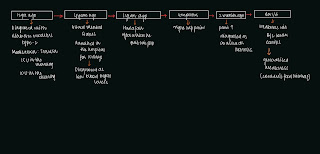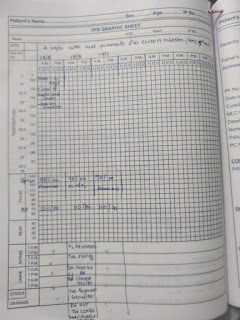50 YEAR OLD MAN WITH BILATERAL LOWER LIMB WEAKNESS
G SUHITHA GNANESWAR
Hall ticket no - 1701006047
This is an online E log book to discuss our patient's de-identified health data shared after taking his/her/guardian's signed informed consent. Here we discuss individual patient's problems through series of inputs from available global online community of experts with an aim to solve those patient's clinical problems with collective current best evidence based inputs. This e-log book also reflects my patient centered online learning portfolio and your
valuable comments on comment box is welcome
CASE
50 year old male patient with weakness of the lower limbs bilaterally since 2 days.
He is a daily wage worker till one year ago. He had a fainting episode after which he stopped going to work.
HISTORY OF PRESENTING ILLNESS
Patient was apparently asymptomatic 4 months back when he developed pain in the right hip region, which was insidious in onset and intermittent at the beginning. Aggrevated on movement and relieved on rest and medication.
He went to the hospital 2 months ago when the pain progressed and became continuous, and was diagnosed with avascular necrosis of the femur due to a trauma to the hip one year ago.
2 days ago, patient developed weakness in the lower limb which progressed upto the hip.
He was taken to the hospital and was prescribed medications. On starting the medication, the weakness worsened.
The next morning, patient required assistance to walk and sit up but was able to feed himself. The weakness progressed so that by the evening he was unable to feed himself. He only responded if called to repeatedly.
Patient also had blood in urine, one month back for 5 days continuously, but did not go to the hospital.
The weakness was not associated with loss of consciousness, slurring of speech, drooping of mouth, seizures, tongue bite or frothing of mouth, difficulty in swallowing.
No complaints of any headache, vomitings, chest pain, palpitations and syncopal attacks.
No shortness of breath, orthopnea, paroxysmal nocturnal dyspnea, abdominal pain or burning micturition.
PAST HISTORY
No similar episodes in the past.
Patient is a known case of diabetes since 12 years. He is on regular medication, with 15 U in the morning before breakfast and 10 U in the evening (7-7:30pm).
He was hospitalized, 4 years ago with low blood sugar, and was admitted for 10 days. He presented with altered mental status.
No history of hypertension, tuberculosis, epilepsy, asthma, thyroid and CAD.
No surgical history.
PERSONAL HISTORY
Diet: Mixed
Appetite: Normal
Sleep: Adequate
Bowel and Bladder: Regular
No allergies
Started alcohol intake 25 years back, and stopped 12 years when diagnosed with diabetes. He used to binge drink alcohol for 10 days continuously every month and then used to stop for 20 days. Cycle repeats every month. Now, consumed alcohol only on special occasions, doesn't exceed 90ml.
Started smoking beedis, one a day, 10 years ago.
Stopped 4 years ago when he went into a hypoglycemic episode, but has resumed one year ago.
FAMILY HISTORY
no similar complaints
GENERAL EXAMINATION
Patient is examined in a well lit room after taking informed consent.
Patient is conscious, coherent and cooperative.
He is moderately built and moderately nourished.
Pallor: Present
Icterus: absent
Cyanosis: absent
Clubbing: absent
Generalized Lymphadenopathy: absent
Edema: Absent
VITALS:
Temperature: Afebrile
Blood Pressure: 124/72 mmHg
Respiratory Rate: 17 cycles per minute
Pulse: 70 bpm
SYSTEMIC EXAMINATION:
CENTRAL NERVOUS SYSTEM EXAMINATION.
Higher mental functions
• conscious
• oriented to person and place
• memory - able to recognize their family members and recall recent events
• Speech - no deficit
Cranial nerve examination
• 1 - couldn't be elicited
• 2- Direct and indirect light reflex present
• 3,4,6 - no ptosis Or nystagmus
• 5- corneal reflex present
• 7- no deviation of mouth, no loss of nasolabial folds, forehead wrinkling present
• 8- able to hear
• 9,10- position of uvula is central
• 11- sternocleidomastoid contraction present
• 12- no tongue deviation
Motor system
Attitude - right lower limb flexed at knee joint
Reflexes
Right Left
Biceps 2+ 2+
Triceps 2+ 2+
Supinator 2+ 2+
Knee 2+ 2+
Ankle 2+ 2+
Superficial reflexes and deep reflexes are present , normal
Muscles power:
Right Left
Upper limb
Elbow - Flexor 5/5 5/5
- extensor 5/5 5/5
Wrist - Flexor 5/5 5/5
- extensor 5/5 5/5
Hand grip 5/5 5/5
Lower limb
Hip - Flexors 5/5 5/5
- extensors 5/5 5/5
Knee - Flexors 5/5 5/5
- Extensors 5/5 5/5
Ankle - DF 5/5 5/5
- PF 5/5 5/5
EHL 5/5 5/5
FHL 5/5 5/5
Right Left
BULK
Arm
Forearm 19cm 19cm
Thigh 42cm. 42cm
Leg 28cm. 28cm
TONE
Upper limbs N N
Lower limbs N N
Gait is normal
No involuntary movements
Sensory system - all sensations ( pain, touch, temperature, position, vibration sense) are normal
INSPECTION:
Chest wall - bilaterally symmetrical
No dilated veins, scars, sinuses
Apical impulse and pulsations cannot be appreciated
PALPATION:
Apical impulse is felt on the left 5th intercoastal space 2cm away from the midline.
No parasternal heave, thrills felt.
PERCUSSION:
Right and left heart borders percussed.
AUSCULTATION:
S1 and S2 heard , no added thrills and murmurs heard.
RESPIRATORY SYSTEM
INSPECTION:
Chest is bilaterally symmetrical
Trachea – midline in position.
Apical Impulse is not appreciated
Chest is moving normally with respiration.
No dilated veins, scars, sinuses.
PALPATION:
Trachea – midline in position.
Apical impulse is felt on the left 5th intercoastal space.
Chest is moving equally on respiration on both sides
Tactile Vocal fremitus - appreciated
PERCUSSION:
The following areas were percussed on either sides-
Supraclavicular
Infraclavicular
Mammary
Axillary
Infraaxillary
Suprascapular
Infrascapular
Upper/mid/lower interscapular were all RESONANT.
AUSCULTATION:
Normal vesicular breath sounds heard
No adventitious sounds heard.
ABDOMEN EXAMINATION
INSPECTION:
Shape – scaphoid
Flanks – free
Umbilicus –central in position , inverted.
All quadrants of abdomen are moving equally with respiration.
No dilated veins, hernial orifices, sinuses
No visible pulsations.
PALPATION:
No local rise of temperature and tenderness
All inspectory findings are confirmed.
No guarding, rigidity
Deep palpation- no organomegaly.
PERCUSSION:
There is no fluid thrill , shifting dullness.
Percussion over abdomen- tympanic note heard.
AUSCULTATION:
Bowel sounds are heard.
INVESTIGATIONS
PLBS- 195mg/dl
HEMOGRAM:
Hemoglobin: 8.6
TLC: 18380
N/L/E/M: 86/06/1/5
Platelet: 2.02
MCV: 71.6
MCH: 24.2
RDW: 15
PCV: 26.4
RBC COUNT: 3.63
ELECTROLYTES:
Na: 145
Cl: 110
K: 2.5
RENAL FUNCTION TESTS
Urea: 74
Creatinine: 3.7
Urine protein / creatinine: 0.27
Spot urine protein: 14.2 mg/ dl
Spot urine creatinine: 51.1mg/dl
LIVER FUNCTION TESTS
Total Bilirubin: 1.34
Direct Bilirubin: 0.55
SGOT:18
ALT:16
ALP:12.3
Total Protein: 6.3
Albumin: 3.16
A/G: 0.73
GRBS
On 2/6
4:30 pm - 272gm/dl
On 3/6
8pm - 176mg/dl ( 8U HAI)
12am- 205mg/dl
8am - 178 mg/dl ( 4 U HAI)
On 4/6
12am - 120mg/dl
8am - 180mg/dl
2pm - 223mg/dl ( HAI 12 U)
On 5/6
8pm- 203mg/dl
12 am - 210mg/dl
8 am - 302mg/dl
On day 5
8pm 478mg/dl
10pm- 325 mg/dl
2 am - 75mg/dl
8 am - 160mg/dl
ECG
On 2/6
On 4/6
on day 1
1) tab ecospirin 70mg OD
2) tab atorvas 10mg OD
3) inj NS, RL at 70ml/hr
4) syrup potchlor 15ml/po/tid
5) normal oral diet
6) inj HAI - TID
10) tab azithromycin 500mg OD
7) 2 amp KCL in 500ml NS slowly over 4-5 hrs
On day 2
1) tab ecospirin 70mg OD
2) tab atorvas 10mg OD
3) inj NS, RL at 70ml/hr
4) syrup potchlor 15ml/po/tid
5) normal oral diet
6) inj HAI - TID
7) proteolytic enema
8) syrup cremaffine
9) tab spironolactone
On day 3
1) tab ecospirin 70mg OD
2) tab atorvas 10mg OD
3) inj NS, RL at 70ml/hr
4) syrup potchlor 15ml/po/tid
5) normal oral diet
6) inj HAI - TID
7) proteolytic enema
8) syrup cremaffine plus 15ml/po/od
9) tab spironolactone 25mg/po/od
11) high protein diet
On day 4
10) tab azithromycin 500mg OD
On day 4
1) tab ecospirin 70mg OD
2) tab atorvas 10mg OD
3) inj NS, RL at 70ml/hr
4) syrup potchlor 15ml/po/tid
5) normal oral diet
6) inj HAI - TID
7) tab ultracet QID
8) syrup cremaffine plus 15ml/po/od
9) tab spironolactone 25mg/po/od
11) high protein diet
On day 5
1) tab ecospirin 70mg OD
2) tab atorvas 10mg OD
3) inj NS, RL at 70ml/hr
4) syrup potchlor 15ml/po/tid
5) normal oral diet
6) inj HAI - TID
7) tab ultracet 1/2 po/ QID
8) syrup cremaffine plus 15ml/po/od
9) tab spironolactone 25mg/po/od
11) high protein diet









































Comments
Post a Comment